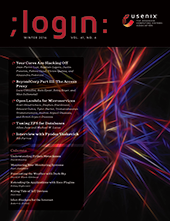USENIX supports diversity, equity, and inclusion and condemns hate and discrimination.
In Praise of Metaclasses!
;login: Enters a New Phase of Its Evolution
For over 20 years, ;login: has been a print magazine with a digital version; in the two decades previous, it was USENIX’s newsletter, UNIX News. Since its inception 45 years ago, it has served as a medium through which the USENIX community learns about useful tools, research, and events from one another. Beginning in 2021, ;login: will no longer be the formally published print magazine as we’ve known it most recently, but rather reimagined as a digital publication with increased opportunities for interactivity among authors and readers.
Since USENIX became an open access publisher of papers in 2008, ;login: has remained our only content behind a membership paywall. In keeping with our commitment to open access, all ;login: content will be open to everyone when we make this change. However, only USENIX members at the sustainer level or higher, as well as student members, will have exclusive access to the interactivity options. Rik Farrow, the current editor of the magazine, will continue to provide leadership for the overall content offered in ;login:, which will be released via our website on a regular basis throughout the year.
As we plan to launch this new format, we are forming an editorial committee of volunteers from throughout the USENIX community to curate content, meaning that this will be a formally peer-reviewed publication. This new model will increase opportunities for the community to contribute to ;login: and engage with its content. In addition to written articles, we are open to other ideas of what you might want to experience.

Much maligned and misunderstood, metaclasses might be one of Python’s most useful features. On the surface, it might not be clear why this would be the case. Just the name “metaclass” alone is enough to conjure up an image of swooping manta rays and stinging bats attacking your coworkers in a code review. I’m sure that there are also some downsides, but metaclasses really are a pretty useful thing to know about for all sorts of problems of practical interest to systems programmers. This includes simplifying the specification of network protocols, parsers, and more. In this installment, we’ll explore the practical side of metaclasses and making Python do some things you never thought possible. Note: This article assumes the use of Python 3.

